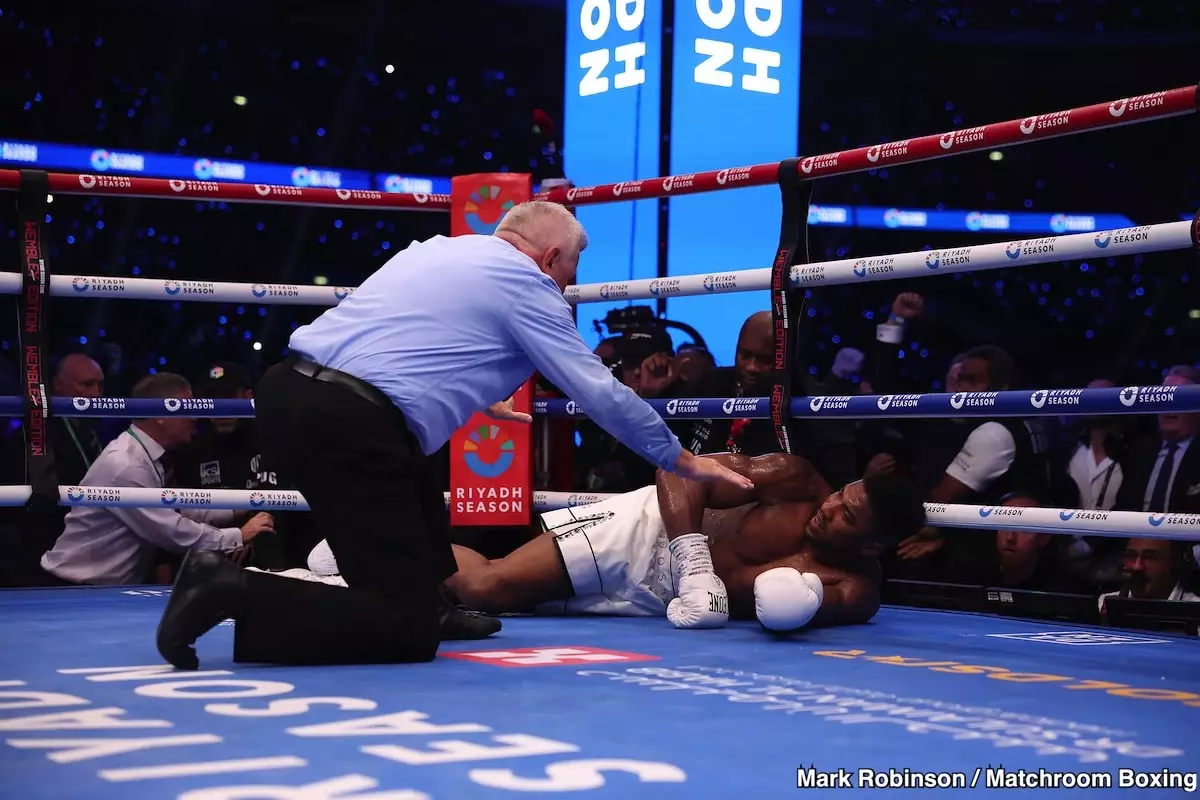The boxing world recently witnessed a thrilling and yet heartbreaking match between two heavyweights: Anthony Joshua and Daniel Dubois. This encounter, which took place in London, showcased a narrative that highlights the fragile nature of a champion’s career. Eddie Hearn, Joshua’s promoter, has openly expressed his pride in Joshua’s resilience and determination despite suffering a devastating knockout. The fight raises important questions about the psychological and physical toll of defeat in boxing and what this might mean for Joshua’s future in the ring.
Boxing is more than just a physical battle; it’s profoundly psychological. For Joshua, his ability to keep rising after being knocked down multiple times reveals an inner strength that few possess. Hearn acknowledged this resilience, emphasizing that Joshua’s courage was evident: “He held his feet and never stopped trying to land big shots.” Such tenacity is often seen in the sport, yet its value cannot be underestimated, particularly when facing a powerful opponent like Dubois. However, one must question if such resolve can outweigh the overwhelming power and experience that Dubois brought into the ring.
The initial round was particularly brutal for Joshua, as he went down early in what Hearn termed a “monster right hand.” From the first knockdown, the fight felt like it had a predetermined outcome, with Joshua fighting against the odds from that moment onward. Hearn’s assertion that Joshua was operating at “30%” after the first round underscores the impact such early setbacks can have on a fighter. The effects of a knockdown can reverberate beyond the ring; a fighter’s confidence and strategy can become clouded and hindered by the fear of more punishment.
As the rounds progressed, Dubois capitalized on Joshua’s vulnerabilities, taking control of the match. Hearn suggested that after the second round, Joshua was already in a position where the fight felt lost. When a fighter is increasingly battered, their ability to fight back becomes an uphill battle. Though Joshua did manage to inflict some damage in the later rounds, including a moment where he stunned Dubois with a powerful right hand, the momentum had already shifted significantly. Fans wondered: Was Joshua simply trying to survive, or did he genuinely believe he could turn the fight around?
In combat sports, momentum is everything. The ebb and flow of power can shift rapidly, but Joshua’s struggle was palpable. Hearn remarked on how tiring it was for Joshua to maintain his composure amidst such adversity. The sight of a formidable champion like Joshua, who once stood at the pinnacle of heavyweight boxing, grappling with the prospect of defeat was disheartening. Entering the ring as a favorite, his loss to a “less experienced” opponent raised eyebrows and stirred skepticism about his future. Would this defeat diminish Joshua’s standing in the boxing hierarchy?
The aftermath of this match has spurred conversations about the necessity of self-reflection and adaptability in the boxing arena. Instead of merely seeking immediate rematches, Joshua should consider evaluating his training approach and strategic mindset going forward. Hearn’s words evoke the sentiment that even in defeat, there is a lesson to be found. One might argue that Joshua’s bulky physique may have hindered his performance in this match, highlighting the importance of agility and swiftness in the ring over sheer muscular strength.
Moreover, the psychological ramifications of this loss cannot be overlooked. Social media opinions reflect concerns about whether Joshua can bounce back from such a damaging defeat. Many speculate that the knockout may have lasting effects on his career trajectory. The narrative of a comeback is appealing, yet it requires more than just a desire to return; it demands a fundamental recalibration of Joshua’s approach to the sport.
A champion’s journey is often paved with uncertainty, and Joshua’s road ahead is no exception. While Hearn’s confidence in Joshua’s indomitable spirit is admirable, boxing fans recognize that true champions evolve based on their trials. It remains to be seen if Joshua can adapt effectively, shaking off the shadow of defeat and reclaiming his standing in the heavyweight division.
This fight is not merely a chapter in Anthony Joshua’s career; it is a transformative experience that could define his legacy. The rise and potential fall of a heavyweight champion can teach valuable lessons, both inside and outside the ring. As boxing fans await Joshua’s next move, the enduring question lingers: will he rise stronger, or will this defeat leave an indelible mark on his boxing identity? The connotations of courage, resilience, and adaptability resonate profoundly as we consider the narrative unfolding in the heavyweight boxing landscape.

